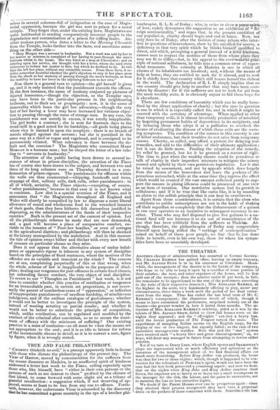TRUE AND FALSE PHILANTHROPY.
"CHARITY thinketh no evil," is a precept apparently little in favour with those who dictate the philanthropy of the present day. The Vicar of Harrow, moved by commiseration for the sufferers from the recent disasters at Madeira, in an unaffected spirit of kindness addressed a letter last week to the Times, calling especially upon those who, like himself, have "either in their own persons or the Persons of such as are dearest to them" profited by the climate of that island, to come forward with some slight aid as a tribute of grateful recollection : a suggestion which, if not deserving of ap- proval, seems at least to be free from any cue to offence. Forth- with, however, the unfortunate Vicar is astounded by the discovery that-he has-committed a great enormity in the eye of a brother phi- lanthropist, R. L. B. of Ibsley; who, in order to show It purer spirit of love, rudely denounces the suggestion as an exhibition of "fo- reign sentimentality," and urges that, in the prespht condition of our population, charity should begin and end at home. Now, not only does he of Ibsley, after the fashion of many Others who inter- fere in questions of benevolence, show by his uncalled-for sneers, a deficiency in that very spirit which be thinks hiniself qualified to direct, and which, prompting a general instead of eifitful kindness, causes men to respect the motives of those from whose, plans they may see fit to differ,—but, in his appeal to the eveMstaktifaltint. Ppt mple of national selfishness, he falls into a common error of super- ficial reasoners. The calamity at Madeira is one in which all classes of its inhabitants are involved; and, without the means of help at home, they are entitled to seek for it abroad, and to seek for it chiefly from that country which still boasts herself the richest in the world. The declaration of R. L. B. simply implies that no one country should give help to another that may have been over- taken by disaster: for if the sufferers are not to look for aid from the most wealthy state, it is obviously unjust to bid them hope for it elsewhere.
There are few conditions of humanity which can be really bene- fited by the direct application of charity ; but the case in question is one in which it is especially called for, and in which it might be exerted with the certainty of advantage. When applied to other than temporary evils, it is almost invariably productive of mischief, by begetting permanent habits of dependence in its recipients, and by inducing those who adopt it as a palliative to overlook the means of eradicating the disease of which those evils are the warn- ing symptoms. The condition of the masses in this country is one of bitter endurance, but their troubles do not arise from temporary causes. Charity, so called, may afford a pretext for delaying true remedies, and add to the difficulties of their ultimate application ; but it can do little more. Pending the adoption of the remedy, let relief be granted, but let it be granted as a matter of right. The time is past when the wealthy classes could be permitted to talk of charity in their imperfect attempts to mitigate the misery caused and upheld by their own pernicious legislation. Let it also be raised by assessment, and not by appeals which draw largely from the means of the benevolent and leave the pockets of the penurious untouched, while at the same time they repress the effect which would be created if the vast amount collected yearly to sup- port the masses in pining idleness could be presented at one view as an item of taxation. Our restrictive system had its growth in selfishness ; and if it be true that like cures like, it is by sounding an alarm to the selfish principle that it can best be overthrown.
Apart from these considerations, it is certain that the class who contribute to public subscriptions are not in the habit of shaking off their superflux so completely that the disbursement of a guinea in one case operates as an incentive to subsequent economy in an- other. Those who may feel disposed to give five guineas to a na- tional fund will not increase it to six out of remembrance of the one that has been withheld from the sufferers at Madeisa. Al- though, therefore, the philanthropist of Ibsley may congratulate himself upon having stifled the "verbiage of cosmopolitanism" raised on behalf of these poor people, we fear That he has done little to benefit, even in his own way, those for whom his sympa- thies have been so unamiably developed.


























 Previous page
Previous page